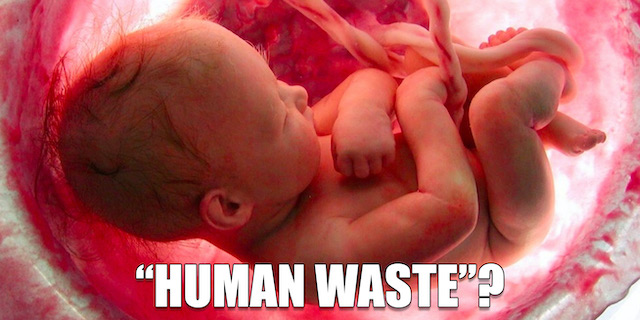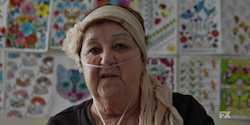“We do not want word to go out that we want to exterminate the Negro population, if it ever occurs to any of their more rebellious members.” ~ Margaret Sanger

No one’s opinion changes the reality that an uninterrupted pregnancy results in the birth of a human child.
(Recently), media outlets are promoting a new documentary (let’s call it a “mockumentary”) titled, “AKA Jane Roe.” Ostensibly, it tells the story of Norma McCorvey, the real-life “Roe” in the 1973 Supreme Court case Roe v. Wade. Apparently, this production is newsworthy three years after her death and a half-century beyond the circumstances that made her the anonymous plaintiff in the case because of a recorded “deathbed confession.” Not only does the production feature her assertion that her pro-life posture was fabricated but also that she received some financial support from pro-life organizations (“anti-abortion” as the MSM frames it).
Before addressing McCorvey’s personal life, a little historical context is due. While Roe v. Wade is a widely recognized case, its companion case, Doe v. Bolton, is little known but far more consequential. Doe was also a pseudonym, protecting the identity of yet another woman. “Mary Doe” was impoverished, abused, and pregnant, circumstances that made her a convenient plaintiff for aggressive lawyers seeking to establish abortion on demand as the virtual law of the land. While the Roe decision established the familiar trimester status for classifying restrictions on ending the lives of children before birth, the Doe decision effectively overruled those restrictions by allowing abortion at any point in pregnancy if it was deemed necessary to protect the health of the mother. In effect, that constituted abortion on demand.
In my various roles as a founder of AAA Women’s Services (now Choices Pregnancy Resource Center) and the Pro-Life Coalition in Chattanooga, Tennessee, I met both Jane Roe and Mary Doe, Norma McCorvey and Sandra Cano, respectively, and spent time with each of them. When I first met them in the mid-1990s, they were both middle-aged women, 25 years past the circumstances that had made them plaintiffs in two of the most important Supreme Court cases in U.S. history.
Neither woman had an abortion. While Norma was a willing participant in the Texas case, she was never told that the length of time necessary for the case to proceed far exceeded the months of her pregnancy. Sandra, on the other hand, was an unwitting victim of her case, which originated in Georgia. She was a poor teenage girl, pregnant by her imprisoned husband and, in her words, exploited by her own mother. It was only after the 1973 decision was announced that she was made aware of her role. Her circumstances were the basis of the case, but she wasn’t seeking to end the life of her child.
The stark irony of the documentary’s claims about McCorvey being “used” by pro-life advocates is that both McCorvey and Cano were used by abortion advocates for these SCOTUS cases.
In the documentary, an obviously ailing McCorvey says, “I took their money and they took me out in front of the cameras and told me what to say. I did it well, too. I am a good actress. Of course, I’m not acting now.” A couple of progressive leftists, who identify themselves as Christians, bolster the claims that McCorvey was paid by some organizations to promote their cause. That may or may not be true, because in Norma’s condition, her perspective was malleable.
Obviously, this “revelation” will be used by the largest abortion mills in the nation, including Planned Parenthood, to bolster their insistence that children before birth have no value.
 Recall that 50 years before Roe v. Wade, Planned Parenthood’s “inspirational” founder, Margaret Sanger, asserted that ministry to the poor, a fundamental tenet of Christianity, is responsible for excessive numbers of “unwanted” ethnic breeds. According to Sanger: “Those vast, complex, interrelated organizations aiming to control and to diminish the spread of misery and destitution and all the menacing evils that spring out of this sinisterly fertile soil, are the surest sign that our civilization has bred, is breeding, and is perpetuating constantly increasing numbers of defectives, delinquents, and dependents. … These dangers are inherent in the very idea of humanitarianism and altruism, dangers which have today produced their full harvest of human waste.”
Recall that 50 years before Roe v. Wade, Planned Parenthood’s “inspirational” founder, Margaret Sanger, asserted that ministry to the poor, a fundamental tenet of Christianity, is responsible for excessive numbers of “unwanted” ethnic breeds. According to Sanger: “Those vast, complex, interrelated organizations aiming to control and to diminish the spread of misery and destitution and all the menacing evils that spring out of this sinisterly fertile soil, are the surest sign that our civilization has bred, is breeding, and is perpetuating constantly increasing numbers of defectives, delinquents, and dependents. … These dangers are inherent in the very idea of humanitarianism and altruism, dangers which have today produced their full harvest of human waste.”
Regarding Sanger’s eugenic plan to rid the nation of the unwanted breeds she called “human waste,” she declared, “We do not want word to go out that we want to exterminate the Negro population, if it ever occurs to any of their more rebellious members.”
Totally rejecting that gross devaluation of human life, when we opened the gates of the National Memorial for the Unborn in the mid-90s, a place where grieving mothers and fathers of aborted children could tangibly memorialize their babies, both Norma and Sandra arrived eager to renounce their participation in the 1973 decisions.
Norma was genuinely glad to take part and her testimony was sincere. But years of physical and substance abuse were very evident in Norma’s demeanor and communication. Her life had been hard, and it showed in all sorts of ways. On the other hand, Sandra’s testimony was equally compelling and was composed and articulate. She was much simpler in her sincerity. That her life had been hard was evident, but it had not taken the toll on her that it had on Norma. (For the record, neither Norma nor Sandra were paid for their participation in the opening of the National Memorial for the Unborn.)
My friend Mark Alexander, who was involved with the National Memorial project from its inception, noted that even in the mid-90s, “Norma showed all the signs of decades of alcohol and drug abuse.”
Alexander said this week: “When I first met Norma, she was deeply troubled by her role being used as a pawn to pave the way for killing pre-born children. But it was apparent then that she also suffered substantial cognitive impairment from years of addiction and her ability to process thoughts would get muddled. That muddling devolved into dementia over the next two decades until her death in 2017. Consequently, I am sure that her comments were far more scripted by the ‘documentary’ producers at the end of her life than the producers suggest they were scripted by pro-life advocates decades earlier when she was more lucid.”
 Perhaps the singular most influential person in Norma McCorvey’s life was Father Frank Pavone, who heads Priests for Life. I know Father Frank and have great respect for him.
Perhaps the singular most influential person in Norma McCorvey’s life was Father Frank Pavone, who heads Priests for Life. I know Father Frank and have great respect for him.
Regarding the documentary, he said this week: “I was privileged to be by her side for her journey for 22 years, from her baptism in 1995 to the day of her death in 2017 — a day on which we had our final conversation and she urged us all to keep pushing forward in the pro-life cause. I received her into the Catholic Church in 1998, led her through an intense spiritual and psychological healing process from the wounds she incurred in the abortion industry, had thousands of conversations and spent countless hours both in public and in private. Her life can’t be summarized in an interview or an article. One had to see the whole pattern, all the ups and downs, to identify her center of gravity. She was wounded and erratic, and yet knew she was a new creation in Christ; she was needful of help and yet fiercely independent, tender of heart and yet capable of fierce anger and rebellion.”
Frank added, “I don’t know what the interview was that the documentary is touting, or what was said leading up to it. What I do know is that the conversion and commitment, the agony and the joy I witnessed firsthand for 22 years, was not a fake. If anything, what the other side has to face up to is that Norma rejected abortion before she became pro-life. The day before the pro-abortion press conference in which she was first revealed as the ‘Roe’ of Roe v. Wade, she told Gloria Allred that she thought abortion was wrong. And while working in abortion clinics, she talked women out of their abortions. If there was any ambiguity, it was about her commitment to pro-choice, not to pro-life.”
“AKA Jane Roe” is scheduled to run on FX today (May 22, 2020). But her “deathbed confession,” released three years after her death when there is no way to ask her about the context for her words, changes nothing. Her life was significant in its own right as an image bearer of God, but it was insignificant in how the Court determined to overturn abortion restrictions across the land. Her circumstances were simply a useful tool in the hands of clever lawyers, and now, clever documentarians.
That she may have been used by either “side” changes nothing in the scope of the abortion debate. No one’s opinion changes the reality that an uninterrupted pregnancy results in the birth of a human child. To end a pregnancy ends a life. It cannot be argued otherwise. Now, some 60 million abortions after Roe v. Wade, the issue far transcends Norma’s life and her words.
Imago Dei!
Written by Patricia Lindley for The Patriot Post, May 22, 2020
